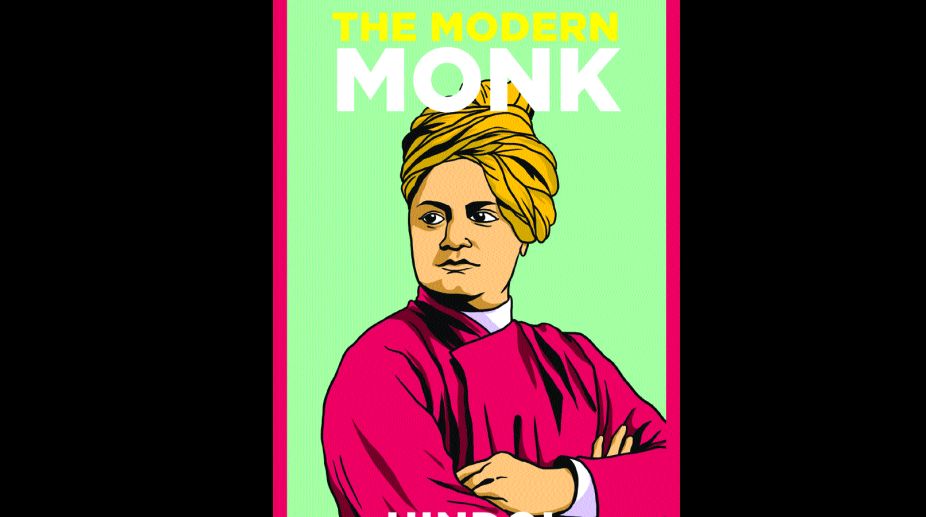In today's world, there is not much significance to the words "monk", "teachings", "preaching", "God", "godliness" and so on. Everyone aspires to be pragmatic and modern even at the cost of losing out on empathy. Do we really know the meaning of being modern? Are we turning out to be selfish beings? Can a monk be modern? Does God exist? These are some of the questions that can be answered with a quiet introspection. Swami Vivekananda, with his intensely compelling divinity, teaches us that to try and understand God, one must truly comprehend one's own self.
Reminiscing about Swami Vivekananda on his 154th birth anniversary, one thing that intrigues about him is that how he stands tall as an inspiration, even in today's time, more than 100 years after his death. Considering the unpleasant incidents across the world, the need of the hour is "humanity". Being human should be the innate quality of all of us, which perhaps we fail to understand most of the times.
Advertisement
More often than not, we tend to overlook the diversity, individuality and are constantly in search of superficial happiness, which certainly does not last long. Swami Vivekananda was one such person, who was a completely modern man, consistently challenging his own views and embracing diverse, even conflicting arguments. He was truly, in all sense, much more than a monk. He was both fascinating and mystifying at the same time. It was perhaps quite difficult to understand his complex persona hidden behind that charming smile and enchanting eyes.
In his seventh book, The Modern Monk, prolific writer Hindol Sengupta argues that it is not just because Vivekananda was close to God but also because he was so tantalizingly immersed in being human that we keep returning to him and his immortal wisdom. The book is centred upon what the "modern monk" means to us today. Hindol opines that it is Vivekananda's modernity that appeals to us today. "Vivekananda is one of the most important figures in the modern imagination of India. From his speech in Chicago that mesmerised America, to his voluminous writings and speeches that redefined the idea of India, he was much more than a monk," writes the author.
There is a wide range of books on Swami Vivekananda. However, this one takes a refreshing look on his life and accentuates his various other untouched facets of life. Hindol says, "Vivekananda loved French cookbooks, invented a new way of making khichri, was interested in the engineering behind shipbuilding and the technology that makes ammunition."
The author writes, "This is the monk, who, as a boy, set up his first club with friends called The Greedy Club. Early in life he was a purchaser of French books on cooking and became an admirer of Gaulish culinary style. He even invented a new way of making khichri called Bhuni Khichuri ~ 'an egg is beaten well and poured over rice. Then one adds peas and potatoes'. And not just that, he knew how to cook meat in various ways and enjoyed a range of snacks ~ from the deep-fried shingara (samosa) to the sweet jibhegaja. This is a man, who demonstrated to his disciples the art of becoming a Jack of all trades. One moment, he would read the holy scriptures to them; the next moment, he would cook them delicacies."
Narendranath Dutta, who grew up to become Swami Vivekananda, made it categorically clear through his actions that he did not have faith in the concept of godmen or miracles. Although he was deeply connected to the godliness, he was still more of a human being, because of which people could easily relate to him. He had a stern Vedantic view but never claimed to have any superpower.
One of the chapters is titled The Monk who smoked. The title is quite interesting and the author writes, "The problem with our understanding of Vivekananda today is that we always choose to ignore the down-to-earth, practical man by focusing too much on his godliness. Here was a monk, who smoked ~ and some of his ill health was, undoubtedly, fuelled by this habit. When I was growing up my mother constantly worried that I would take to tobacco in my school and college years, and though I did smoke for some time in my late college years, I gave up soon after ~ no credit to my mother's exhortations. That the monk she worshipped had smoked seemed to have been conveniently blacked out. This is just a small, but critical, example of why I chose to write about Vivekananda. It seemed to me that his message had become diluted and dulled in today's India."
As a young Narendranath, he had to go through various struggles in life like any other human being. He had to set aside his feeling of empathy for a while to fight for his family's good. Hindol explains, "My argument in this book is that these troubles make Vivekananda even more interesting and real as a character for us to engage with today. He is not some distant, aloof figure shrouded in mist. He is an Indian man, perpetually torn by that most Indian of happenstances ~ family trouble."
Quite clearly, Vivekananda has a lot of relevance to our life and times. Today, we are afraid to question our existence and are paranoid about any qualm, fear or doubt, in a race towards being "perfect". However, more than a century ago, he proved that he is more modern than anyone else and always questioned things around him. He was a firm believer of Vedanta but also held a view that every religion should stand the test of science. This is quite pertinent to the modern times, where the freedom to raise questions appears to be dwindling.











